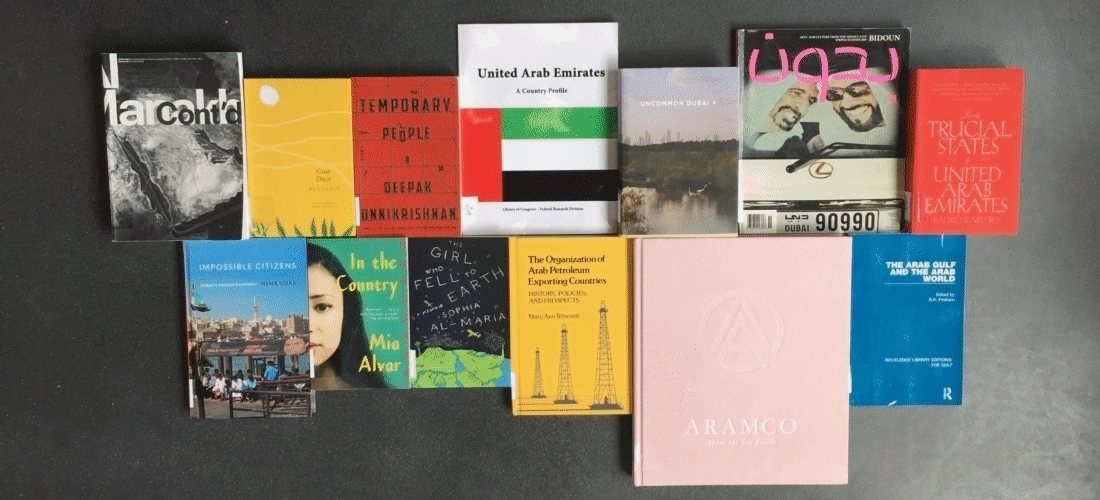Reading the Gulf - Reading Groups in Jameel Arts Centre
The Jameel Library in Jameel Arts Centre is running two reading groups between April and August.
One reading group is in Arabic and one is in English. Both reading groups will address what it means to live and work in the Gulf, “through the lenses of urban theory, social structures and critique of Gulf studies literature. The sessions vary in approach and focus on participatory urban development, ‘direct urbanism,’ and political influences in popular culture including Manga.”
Each reading group will have a moderator. They are free to attend, but is limited to 15 participants per session and you must register in advance to get the reading materials.
Register by sending an email to library@artjameel.org
Each session will be open to 15 participants, on a first-come first-serve basis. Participants are expected to commit to the reading material. Readings are sent directly to the registered participants.
Reading the Gulf - Arabic sessions
Jameel Library
April 27, June 8, July 13, August 3
4 - 6 pm
Husam Helali, Multidisciplinary writer from Sudan based in Dubai, recently published his book The Last Days Of Khartoum
The reading group thinks about experiences of living and working in the Gulf through a selection of texts looking at the history of the region from the 14th Century to present with varying genres including fiction, historical and anthropological texts written by authors from Europe, the Gulf and the Arab world.
Assigned Arabic language books to read:
حتى ينتهي النفط لصامولي شيلكه
يا زمان الخليج لخالد البسام
تحفة الأنظار في غرائب الأمصار وعجائب الأسفار لابن بطوطة
وردة لصنع الله إبراهيم
بر دبي لزياد عبدالله
Reading the Gulf - English sessions
Jameel Library
April 27, June 22, July 27 and August 3
11am - 1pm
April 27
Rana Al Mutawa, PhD Candidate at the University of Oxford researching urban space in the Gulf
This session looks into literature produced on urbanity and the use of public spaces in the Gulf. It compares two approaches in literature and research that is produced on the region.
One that depicts new developments as segregated and ‘sanitised’ and older spaces ‘authentic’ and public; while the other presents rhetoric that explores the social meanings behind these newer commercial spaces.
June 22
Mohammad Shaibani, Comic-book artist
Addressing the popularity of Manga in the Gulf, this session thinks about the cultural and political implications behind the phenomenon, from the choices of Arab voice-over actors, to dubbing and music compositions.
The discussion focuses on timelines, affiliations and critical readings of the genre.
July 27
Adina Hempel, Architect, urban researcher and Associate Professor at the College of Arts and Creative Enterprises at Zayed University in Dubai
The urban landscape of cities along the Arabian Gulf has witnessed a significant growth over the past decades. While cities are a manifestation of cultural, economic and technological progress at a given time and place, they are also a response to community needs in the best-case scenario.
How does urban participatory development in the Gulf differ from methods used in other parts of the world and what are ensuring factors for its success?
August 3
George Katodrytis, Professor and Head of the Department of Architecture at the American University of Sharjah
From the 2004 ‘Metropolitan Dubai and the Rise of Architectural Fantasy’ to the 2018 ‘Aficionados of the Unhomely Center and the Idio(ts)syncrasy of the Periphery’ and from the ‘mega’ to the ‘social’ every aspect of the city has seemingly been reported. Yet Dubai has not ceased to inspire on its future urbanism.
In a domain of abundant real estate speculative developments where the imaginary is sold as the real, there is no longer a place for the real. Paradoxically the center of Dubai is doing the opposite: the real has become imaginary. There is no architectural past to romanticise, only the future to fantasize about, and a present to consume: direct urbanism.

